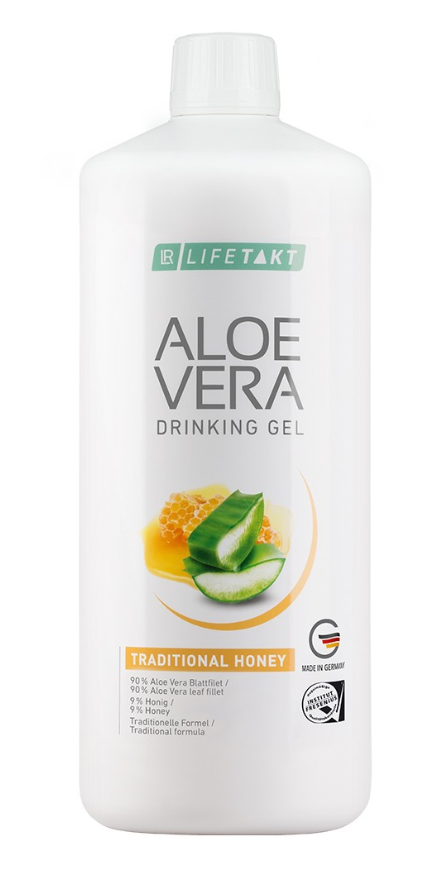FAQ
How can you ensure more movement in everyday life?
More and more people are moving too little. We spend a lot of time at our desks, we travel to work by car, and there are escalators and lifts almost everywhere. But even small tricks can help you get more exercise in your everyday life and do something for your fitness. Short distances can be covered on foot or by bike. If you travel by public transport, you can get off one stop earlier and walk. Always use the stairs instead of lifts and take a walk in the evening instead of sitting on the couch in front of the TV.
What is Aloe Vera Drinking Gel made of?
The leaves of the aloe vera plant are very fleshy. The leaves are enclosed on the outside by a thick, green leaf bark. The inside of the leaves consists of gel-like, parenchymatic tissue, the aloe vera leaf gel. Only this leaf gel with all its valuable ingredients is used for the Drinking Gel.
Why does LR use only Aloe Vera Barbadensis Miller for the production of Aloe Vera products?
Of the more than 200 Aloe Vera species, the Barbadensis Miller is the only variety that can be used as food. The frequently mentioned Aloe Arborescens has a very high aloin content and is therefore unsuitable for consumption. LR therefore only uses Aloe Vera Barbadensis Miller for the production of Aloe Vera products.
Could one cut open an aloe vera plant at home and drink the gel just like that?
It is not advisable to consume the pure leaf gel of the aloe vera plant in unprocessed form. One must cleanly separate the bark of the leaves from the gel inside. Underneath the bark, there is a layer of aloin, which comes out as a thick yellow juice if not processed properly. It must be carefully removed before consumption. This should be done under expert guidance. Aloin is a very strong laxative ingredient that can cause diarrhoea if taken in high concentrations. All Aloe Vera Drinking Gels from LR are therefore regularly subjected to careful aloin testing. In addition, aloe vera in its pure form has a bitter taste. In any case, it is easier to consume an Aloe Vera Drinking Gel from LR - and it tastes better.
Are the aloe vera plants that LR uses for the Aloe Vera Drinking Gel grown under organic conditions?
The cultivation of the aloe vera plants in Mexico is not officially certified by an organic seal, but LR strictly ensures that the use of fertilisers, pesticides and other chemicals is completely avoided during cultivation.
Is LR's Aloe Vera Drinking Gel the only Aloe Vera drink on the market with the SGS INSTITUT FRESENIUS seal of quality?
Currently, only LR's Aloe Vera Drinking Gel bears the strict quality seal of SGS INSTITUT FRESENIUS.
What is SGS INSTITUT FRESENIUS?
SGS INSTITUT FRESENIUS awards one of the toughest and most coveted seals of quality for foods and food supplements today. Since 2003, SGS INSTITUT FRESENIUS has been part of the Société Générale de Surveillance (SGS), which was founded in France in the 19th century to carry out grain inspections. Today, the company focuses on services in laboratory analysis and certification of foodstuffs and consumer goods.
How does the SGS INSTITUT FRESENIUS quality seal differ from other test seals?
There are many different test seals and laboratory service providers in the food sector. However, the SGS INSTITUT FRESENIUS is one of the best-known test seals on the market, alongside other providers such as Ökotest or Stiftung Warentest. SGS INSTITUT FRESENIUS has achieved this recognition because it has been committed to the highest quality for over 47 years - a sustainable concept that works: SGS INSTITUT FRESENIUS is now one of the most demanding quality seals on the market! Another point is the regularity of the controls. The seal is not based on selective checks, but confirms the state of permanently high quality standards. Just to obtain the seal, numerous preliminary tests are carried out on the corresponding product. Everything is checked: from the raw materials to the finished product to the filling. Undercover test purchases by the SGS INSTITUT FRESENIUS check the consistently high quality in the end product. LR voluntarily undergoes such a strict and detailed control in order to certify the high quality of its products.
What is the IASC (International Aloe Science Council)?
The IASC is a scientific association dedicated to the dissemination and use of knowledge about the beneficial properties of the aloe vera plant. Based in Maryland (USA), the IASC offers the possibility to certify Aloe Vera products according to strict standards in order to highlight their quality.
What are in-process controls and what role do they play in the production of LR's Aloe Vera Drinking Gel?
In-process controls are an important and very extensive procedure to monitor the entire manufacturing process step by step. During production, samples are taken after each individual manufacturing step. This is to guarantee the highest possible quality of the Aloe Vera Drinking Gels.
Can the LR Quality Control research laboratory in Ahlen carry out all the important measurement methods needed to achieve the high quality of the gel? To what extent does it differ from other laboratories?
As Europe's largest importer of Aloe Vera, LR has specialised in the analysis of this plant, so that almost all tests can take place in the LR Quality Control laboratory in Ahlen. Only NMR spectroscopy and aloin analysis are carried out in a special laboratory. Nevertheless, there is hardly any other laboratory in Germany where Aloe Vera is examined more frequently than at LR. Thanks to years of experience, knowledge of specific ingredients, an extensive analysis portfolio and such a large number of samples, LR thus has one of the leading laboratories in aloe vera analytics worldwide.






